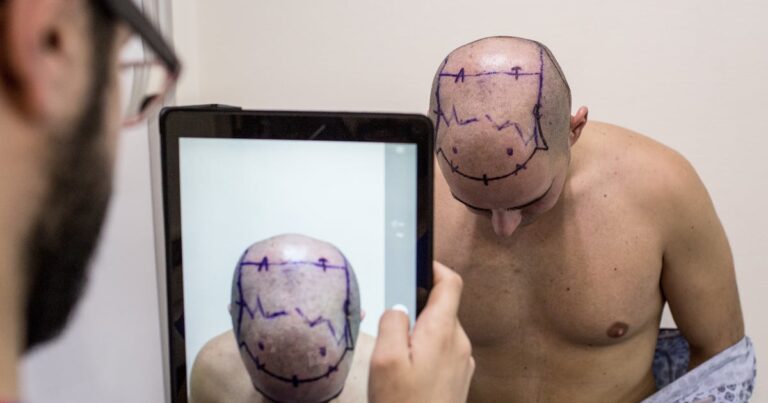Leading British doctors have warned that the National Health Service is left to “solve” the complications that come with a rise in surgical tourism.
There are also concerns that normal-weight people are buying weight-loss drugs such as Ozempic and Wegoby online without proper “comprehensive” care.
More people are travelling overseas for procedures such as weight loss surgery and hair transplants, but they may not get the same standard of care they would expect in the UK, said David Strain, professor of cardiometabolic health.
Prof Strain, chair of the British Medical Association’s scientific committee, said doctors in the UK were seeing an increase in the number of patients suffering from complications such as infections from surgery.
The Foreign Office travel advice says the standard of medical centres and available treatments “can vary widely globally”, and points to the cases of six British nationals who died after medical procedures in Turkey in 2023.
Doctors attending the BMA’s national annual conference in Belfast heard that surgical tourism is a “boom” and is “leading to an increase in serious complications and deaths after surgery”.
Delegates passed a motion expressing concern for patients who require emergency surgery when they return to the UK.
The motion also calls for an expansion of weight management services which would be “partly” funded by an increase in sugar tax.
Lose weight the healthy way – in pictures
A brisk 30-minute walk on a treadmill can burn about 150 calories. Sarah Dear/National
“Some clinics overseas offer bariatric surgery for much less than the cost of disposable equipment used on the NHS. Follow-up is usually non-existent,” said Dr Samuel Parker, from the BMA, who submitted the motion.
“[There are] There have been reports of corners being cut, improper use of disposable equipment and patients suffering serious complications requiring urgent NHS treatment.”
Speaking about the sugar tax, Dr Parker said: “After a tax was imposed on sugary drinks in England, the incidence of obesity among primary school-aged children fell.”
“It’s estimated that 5,000 cases of obesity per year could be prevented among sixth-grade girls alone.”
“Surgical tourism has been a problem for a long time,” Prof Strain told reporters.
“People often disappear in South Africa and Turkey, but there are many other places they disappear to.
“Any surgery, not just bariatric surgery but even something as simple as a hair transplant that people go out of their way to see, can have complications later on.
“There is a risk of contracting an infection and the problem is that people are coming back and asking the NHS to take over some of the procedures that have been carried out to a lower standard than would normally be applied in the UK.”
“Wellness tourism is on the rise because people are a little more affluent. It’s easier to travel abroad now, and the internet makes it easier to plan these things.”
He said the rise in anaesthetic procedures abroad was being driven by a “social media nation” where people feel the need to present themselves in a certain way.
“You can never guarantee the surgical standards in each country or the equipment used, so there’s a risk there,” Prof Strain said.
He said patients returning from overseas and needing urgent treatment after botched surgeries were taking up beds that could be used for elective surgeries, adding to the delays.
“Health tourism has the potential to cause significant problems for already overburdened health services,” Prof Strain said.
Regarding weight-loss drugs, he said: “One of the big concerns about using these drugs without comprehensive services is that they simply give you a weight-loss drug without the proper comprehensive care and discuss the dietary changes that are needed and the exercise that is absolutely necessary.”
“Then people start losing fat, muscle and other tissues and they end up with a condition called sarcopenic obesity. They basically lose muscle at the same rate as fat and they end up with a very haggard look, known as the wegoby face.
“All the trials of weight loss drugs have all involved lifestyle interventions and dietary advice in addition to the drug.
“And the concern is that if you buy these drugs on the internet without that support, you end up injecting them yourself and we don’t know if the health benefits are the same in that situation.”
Prof Strain said one of the problems with weight-loss drugs was that they had not been tested in normal weight people so it was unclear how well they worked.
“There is always concern that online medications can have side effects or interactions that could lead to unwanted effects if given to the wrong person.
“Any drug can cause harm if given to the wrong person.
“Living with obesity changes the chemistry in your brain. These medications are meant to correct that chemistry in your brain so that food makes you feel full and you start eating normal portions.
“If your weight is completely normal and there are no changes in your brain chemistry, it’s entirely possible that the medication won’t work at all.
“Or it could very well be that it messes with your brain chemistry.
“These drugs have never been tested in those populations before. The drugs that have been tested have done wonders for people who are obese, they’ve done wonders for people with diabetes, and they’re starting to work in kidney disease and other conditions.”
“But throughout all the trials, no one has ever used these drugs in people of normal weight who don’t have diabetes, because it doesn’t make sense.
“So if you ask me what the impact is, I don’t know.”
Updated: June 25, 2024 8:38 PM

